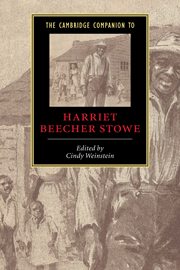Book contents
- Frontmatter
- Introduction
- 1 Stowe and race
- 2 Uncle Tom’s Cabin and the south
- 3 Uncle Tom’s Cabin and the American Renaissance
- 4 Reading and children:Uncle Tom’s Cabin and The Pearl of Orr’s Island
- 5 Uncle Tom and Harriet Beecher Stowe in England
- 6 Staging black insurrection: Dred on stage
- 7 Stowe and regionalism
- 8 Stowe and the law
- 9 Harriet Beecher Stowe and the American reform tradition
- 10 Harriet Beecher Stowe and the dream of the great American novel
- 11 Stowe and the literature of social change
- 12 The afterlife of Uncle Tom’s Cabin
- Select bibliography
- Index
- Series List
10 - Harriet Beecher Stowe and the dream of the great American novel
Published online by Cambridge University Press: 28 May 2006
- Frontmatter
- Introduction
- 1 Stowe and race
- 2 Uncle Tom’s Cabin and the south
- 3 Uncle Tom’s Cabin and the American Renaissance
- 4 Reading and children:Uncle Tom’s Cabin and The Pearl of Orr’s Island
- 5 Uncle Tom and Harriet Beecher Stowe in England
- 6 Staging black insurrection: Dred on stage
- 7 Stowe and regionalism
- 8 Stowe and the law
- 9 Harriet Beecher Stowe and the American reform tradition
- 10 Harriet Beecher Stowe and the dream of the great American novel
- 11 Stowe and the literature of social change
- 12 The afterlife of Uncle Tom’s Cabin
- Select bibliography
- Index
- Series List
Summary
The first critical call on record for “the great American novel” (by novelist John W. DeForest in 1868) names Uncle Tom's Cabin as the closest approximation yet. Small wonder. One can imagine at least four reasons why, especially in the aftermath of the Civil War. First, the novel's foregrounding of slavery as the defining national issue. Second, the book's sensational impact, provoking a vast array of imitations and refutations, perhaps even the Civil War itself (if we take seriously Abraham Lincoln's bon mot). Third, its record-breaking sales, which demonstrated the reality of national literary emergence as a hard economic fact: the United States was now the largest book market in the English-speaking world. And fourth, the novel's panoramic reach, combining the geographical scope of a Whitman with the sociological profusion of a Dickens.
This last was the point that especially interested DeForest. Though he scoffed at the books idealizing exoticization of Tom and Eva, he praised “the national breadth to the picture, truthful outlining of character, natural speaking, and plenty of strong feeling.” By contrast, all the other authors on his radar screen seemed provincial, even the incomparable Nathaniel Hawthorne; and he was harshly dismissive of Stowe’s own regionalist turn as well. (“Stricken with timidity, the author shrank into her native New England.”)
- Type
- Chapter
- Information
- The Cambridge Companion to Harriet Beecher Stowe , pp. 190 - 202Publisher: Cambridge University PressPrint publication year: 2004
- 2
- Cited by



